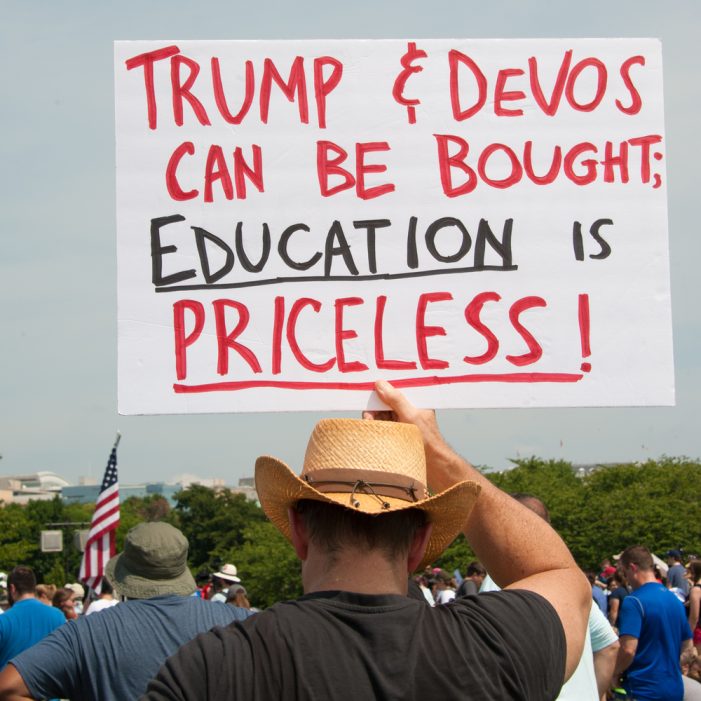By Linda Nwoke | Editorial credit: Rena Schild / shutterstock.com
As the year 2025 approaches, many Americans are filled with mixed feelings, including excitement and anxiety. By January 20, President-Elect Donald Trump will be sworn into office for a second term. Yet, there are concerns, especially regarding the proposed drastic reduction of the Department of Education and a reevaluation of federal funding priorities. Many of these proposed changes will have controversial implications for schools embracing inclusive and diverse instructional programs.
A group of experts gathered to address the issues, focusing on what lies ahead for various stakeholders, including students, educators, and institutions, in American education policy.
The event was organized by Ethnic Media Services, and the expert opinions of Pedro Noguera, Dean of USC’s Rossier School of Education; Thomas Toch, Director of Georgetown University’s McCourt School of Public Policy; and Thomas A. Saenz, President and General counsel of MALDEF, shared their views on the potential repercussions at the national and state levels of education.
Possibility of Conflict and Resistance in Education Policy Under Trump
The Dean of USC’s Rossier School of Education, Pedro Noguera, envisages the state of education under the Trump administration as a potential chaotic wrestling match. He captures the situation with a call to action—”Get ready to rumble,” as he describes the situation under Trump’s appointee Linda McMahon, who leads the Department of Education. His statement captures the expectation of massive resistance and conflict, especially from surprising sources, including Republicans in rural areas and Congress.
Noguera highlighted the critical role of the Department of Education. He warned that any attempt to disrupt some of the programs like Title I, which provides supplemental resources to schools serving impoverished children, and Pell Grants, which enable low-income students to attend college, will be opposed by Congress. “These programs, rooted in civil rights legislation, are highly popular and essential,” Noguera noted.
The Era of Ideology-Driven Policy and Culture Wars
He also speculated on the proliferation of ideological-driven policies as the bane of the administration’s agenda. Noguera suggested that its primary focus will be on promoting culture wars. “We’ll see a lot of attacks on DEI [Diversity, Equity, and Inclusion] and the rights of transgender students,” he predicted. Noguera also noted potential efforts to use the Department of Education’s Office of Civil Rights to achieve the purpose. He highlighted the importance of vigilance and resistance to policies that could undermine critical support for education and escalate cultural divisions.
Public Opposition to Vouchers and Need for Educational Reform
Furthermore, there will be strong public opposition to Trump’s push for school choice and voucher programs, as evidenced in the overwhelming rejection of voucher initiatives in the last election in three states—Republican-led Kentucky, Nebraska, and swing state, Colorado. “The public has shown repeatedly a distaste for voucher initiatives, which often subsidize affluent families at the expense of poor ones,” he noted
Moreover, broader educational challenges hinged on culture wars detract from addressing urgent educational issues such as the pandemic-exacerbated gaps in math and reading achievement, a lack of scientific literacy, and deficiencies in civics education. These highlight systemic problems in K-12 education.
At the higher education level, they face challenges such as declining enrollment and prohibitive costs, with the possibility of closing institutions that are unable to sustain themselves. Noguera called for greater accountability in federal funding while criticizing the Biden administration’s inadequate oversight of COVID relief funds. “There is a need for reform and change,” Noguera stated, adding that the critical question is whether the administration will support meaningful reform or merely create further disruption.
Noguera reiterated the risk that political distractions might overshadow the substantive issues facing the U.S. education system at all levels.
Education: A Low Priority for the Trump Administration
A second expert, Thomas Toch, director at Georgetown University’s McCourt School of Public Policy, noted an apparent lack of interest in public education, which serves over 90% of the nation’s students, by the Trump administration.
He highlighted the administration’s indifference to systemic public education reforms and focus on prioritizing ideological and deregulatory policies over student outcomes. For instance, the administration is focused on taxing the endowments of elite higher education institutions, despite evidence that most colleges and universities have little to no endowment funds.
Additionally, Toch expects renewed efforts to dismantle regulations on the for-profit education sector, which the Biden administration reinstated to protect students from predatory practices. He warned that these deregulations could weaken accountability and harm students.
There are concerns that the administration’s lack of commitment to improving public education, combined with potential rollbacks in accountability measures, could exacerbate inequities and fail to address the needs of underserved communities.
Federal Student Aid (FAFSA) Challenges
Thomas Toch highlighted the ongoing challenges with the federal student aid application process (FAFSA), which he described as “poorly managed” by the Biden administration and needs to be addressed by the incoming Trump administration. He stated, “Federal funding plays an important role in enabling students who have traditionally been underrepresented in higher education.”
Predictions on Areas of Changes in Educational Policy
Toch made some predictions in various areas. For instance, he predicted potential cuts to critical student support programs such as Pell Grants, AmeriCorps, and federal work-study initiatives: “It will probably be in the Trump budget,” he said, adding that whether sufficient pushback from Democrats and self-interested Republicans will occur “remains to be seen.”
Furthermore, there will be a renewed push for private school choice legislation due to the strong support among red-state policymakers despite recent defeats in voter referendums in two conservative states. He stated, “There’s a tremendous amount of pressure on Republican lawmakers, and while the legislation has a good chance of passing, its ultimate fate remains uncertain,” said Toch. Besides, he foresees a call by the Republicans for significant budget cuts and block grants, that will consolidate various funding streams into single allocations that states can manage independently.
Talk agreed with other experts that the Office for Civil Rights within the Department of Education is likely to become a platform for opposing diversity, equity, and inclusion (DEI) initiatives. He stated, “The civil rights office is likely to become a promoter of opposition to diversity, equity, and inclusion initiatives,” reflecting a broader cultural and political shift in the administration’s agenda.
A Solution to the Educational Challenges: A Call for Student-Focused Leadership
The director emphasized the urgent need to address systemic academic struggles rather than politics to save U.S. students. “Some 54% of adults aged 16 to 74 in this country read below the sixth-grade level, according to U.S. Department of Education data.” He stressed the key role of federal leadership in improving education, especially for underserved communities, stating, “Federal leadership does matter—not only with the money it provides but also as a source of leadership.”
With changing demographics and evolving workforce demands, Toch underscored the need for higher-level education for traditionally underserved populations. While education remains a state and local responsibility under the Constitution, he stressed the importance of federal support as both a financial and moral lever for equity, concluding, “We may not be getting the leadership that we really need on the school improvement front.”
In Toch’s view, the Trump administration’s approach to education policy will be a mix of fiscal conservatism, ideological opposition to government spending, and the promotion of private school choice. This will have significant implications for equity and access in both higher education and K-12 systems.
Uncertainty in Policy Actions
The third expert, Thomas A. Saenz from MALDEF, noted the history of unpredictability in fulfilling promises with the incoming administration. Regarding education, Saenz stated, “President Trump has a history of promising all kinds of things and not actually delivering on those purported promises.” Saenz criticized the use of exaggerated rhetoric on immigration enforcement, describing it as a “scare campaign” aimed at driving self-deportation. He predicted that early in Trump’s term, the administration might announce inflated numbers of people leaving the country due to its policies, calling it a tactic to foster their narrative.
Despite this rhetoric, Saenz is convinced that the legal protections will remain intact. He highlighted the 1982 Supreme Court decision in Plyler v. Doe, which guarantees all children, regardless of immigration status, the right to attend free public school from kindergarten through 12th grade. He asserted that this decision has remained legally sound and is not under immediate threat.
He also addressed the challenges in eliminating Deferred Action for Childhood Arrivals (DACA), which the Trump administration attempted to end but was deterred by the Supreme Court. Over the years, the Court’s composition has shifted; however, eliminating DACA will be more procedurally difficult. “No announcement from the attorney general, and no announcement from Trump himself would immediately end DACA,” stated Saenz.
Instead, the administration will need to go through the formal public notification, comment, and review process before making any changes. Saenz highlighted the challenges civil rights in education may face under the Trump administration. However, the most significant changes will require congressional action, which is currently evenly divided. Key protections like DACA and anti-discrimination measures are deeply entrenched in federal law and backed by procedural safeguards, making abrupt changes difficult.
He observed that if the administration shifts its position, the tedious rulemaking process to repeal DACA would delay any immediate action. “The courts remain a protection against precipitous elimination of funding for anyone engaged in progressive measures concerning education,” says Saenz
Realistically, the rhetoric from the administration may amplify anti-immigrant, anti-DEI, and anti-civil rights narratives, thereby pressurizing local officials into retreating from progressive policies. However, these efforts are limited by due process requirements, the need for court rulings, and the inability of the Department of Education or Justice to act unilaterally. “Regardless of his desires to be a dictator, under our system, the president and his cabinet members do not have dictatorial power,” Saenz stated, urging vigilance in monitoring congressional actions that could impact civil rights.
Additionally, while the narrative about overturning Plyler v. Doe may persist, the landmark decision ensuring all children access to free public education is not in imminent danger. Legal barriers make implementing laws that violate Plyler extremely difficult.
Despite the unlikelihood of action, there are concerns over the repercussions of rhetoric. This highlights how fear-mongering during the first Trump administration caused real harm, even without policy follow-through. “We need to do the best we can to prepare for that very dangerous rhetoric,” says Saenz.


